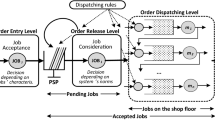Abstract
Emerging ubiquity of smart sensing in production environments provide opportunities to make use of fine-grained, real-time data to support decision-making. One, currently untapped opportunity is the prediction of order remaining completion time (ORCT) which can be used to improve production scheduling. Recent research has focused on the development of ORCT prediction models however, their integration into scheduling algorithms is an understudied area, especially in job shop environments where processing times can be highly variable. In this paper, an artificial neural network was developed to predict ORCT based on real-time job shop status data which is then integrated with classical heuristic rules for facilitating dynamic scheduling. A simulation study with four scenarios was developed to test the performance of our approach. The results demonstrated improved completion time, however tardiness was not reduced under all scenarios. In moving this research forward, we discuss the need for further research into combining static and dynamic characteristics and priority rule design for satisfying multiple objectives.
Access this chapter
Tax calculation will be finalised at checkout
Purchases are for personal use only
Similar content being viewed by others
References
Bender, J., Ovtcharova, J.: Prototyping machine-learning-supported lead time prediction using AutoML. Procedia Comput. Sci. 180(5), 649–655 (2021)
Wang, C., Jiang, P.: Deep neural networks based order completion time prediction by using real-time job shop RFID data. J. Intell. Manuf. 30(3), 1303–1318 (2017). https://doi.org/10.1007/s10845-017-1325-3
Fang, W., Guo, Y., Liao, W., et al.: Big data driven jobs remaining time prediction in discrete manufacturing system: a deep learning-based approach. Int. J. Prod. Res. 58(9), 2751–2766 (2020)
Gunasekaran, A., Patel, C., Tirtiroglu, E.: Performance measures and metrics in a supply chain environment. Int. J. Oper. Prod. Manag. 21(1), 71–87 (2001)
Wang, H., Peng, T., Tang, R., et al.: Smart agent-based priority dispatching rules for job shop scheduling in a furniture manufacturing workshop. In: ASME 2020 15th International Manufacturing Science and Engineering Conference, pp. 1–8. Virtual Online (2020)
Altendorfer, K., Jodlbauer, H.: An analytical model for service level and tardiness in a single machine MTO production system. Int. J. Prod. Res. 49(6), 1827–1850 (2011)
Hu, S., Zhang, B., Zhang, X.: Order completion date estimation and due date decision under make-to-order mode. Ind. Eng. J. 15(3), 122–129 (2012)
Li, M., Yang, F., Wan, H., et al.: Simulation-based experimental design and statistical modeling for lead time quotation. J. Manuf. Syst. 37, 362–374 (2015)
Hsieh, L., Chang, K., Chien, C.: Efficient development of cycle time response surfaces using progressive simulation metamodeling. Int. J. Prod. Res. 52(9–10), 3097–3109 (2014)
Liu, D., Guo, Y., Huang, S., et al.: A SOM-FWFCM based feature selection algorithm for order remaining completion time prediction. China Mech. Eng. 32(9), 1073–1079 (2021)
Huang, J., Chang, Q., Arinez, J.: Product Completion time prediction using a hybrid approach combining deep learning and system model. J. Manuf. Syst. 57, 311–322 (2020)
Braune, R., Benda, F., Doerner, K., et al.: A genetic programming learning approach to generate dispatching rules for flexible shop scheduling problems. Int. J. Prod. Econ. 243, 108342 (2022)
Blackstone, J., Phillips, D., Hogg, G.: A state-of-the-art survey of dispatching rules for manufacturing job shop operations. Int. J. Prod. Res. 20(1), 27–45 (2007)
Little, J.D.: OR FORUM---Little’s law as viewed on its 50th anniversary. Oper. Res. 59(3), 536–549 (2011)
Gyulai, D., Pfeiffer, A., Bergmann, J., et al.: Online lead time prediction supporting situation-aware production control. Procedia CIRP 78, 190–195 (2018)
Flask-http-client. https://pypi.org/project/flask-http-client/
Loffe, S., Szegedy, C.: Batch normalization: accelerating deep network training by reducing internal covariate shift. JMLR.org (2015)
Author information
Authors and Affiliations
Corresponding author
Editor information
Editors and Affiliations
Rights and permissions
Copyright information
© 2022 IFIP International Federation for Information Processing
About this paper
Cite this paper
Wang, H., Peng, T., Brintrup, A., Wuest, T., Tang, R. (2022). Dynamic Job Shop Scheduling Based on Order Remaining Completion Time Prediction. In: Kim, D.Y., von Cieminski, G., Romero, D. (eds) Advances in Production Management Systems. Smart Manufacturing and Logistics Systems: Turning Ideas into Action. APMS 2022. IFIP Advances in Information and Communication Technology, vol 664. Springer, Cham. https://doi.org/10.1007/978-3-031-16411-8_49
Download citation
DOI: https://doi.org/10.1007/978-3-031-16411-8_49
Published:
Publisher Name: Springer, Cham
Print ISBN: 978-3-031-16410-1
Online ISBN: 978-3-031-16411-8
eBook Packages: Computer ScienceComputer Science (R0)





